SAINT PAUL, Minn. — Getting healthy, local food to Minnesota’s children, providing support for emerging farmers and building resilient soil were the topics of conversation when over 170 Land Stewardship Project (LSP) members and allies gathered in Saint Paul March 13 for the 20th iteration of the Family Farm Breakfast at the Capitol.
Minnesota Lieutenant Governor Peggy Flanagan and Attorney General Keith Ellison joined area farmers as the event’s featured speakers. Sylvia Burgos Toftness, a farmer and member of LSP’s program committee, kicked off the event by encouraging farmers, rural residents and others gathered in the basement of Christ Lutheran Church to cross the street and meet with lawmakers after the breakfast. Only a little over 1% of the U.S. population is involved in farming, according to the U.S. Census of Agriculture. That means those people who are involved in agriculture as well as those who care about building a sustainable farm and food system need to speak up and share their stories, said Burgos Toftness.
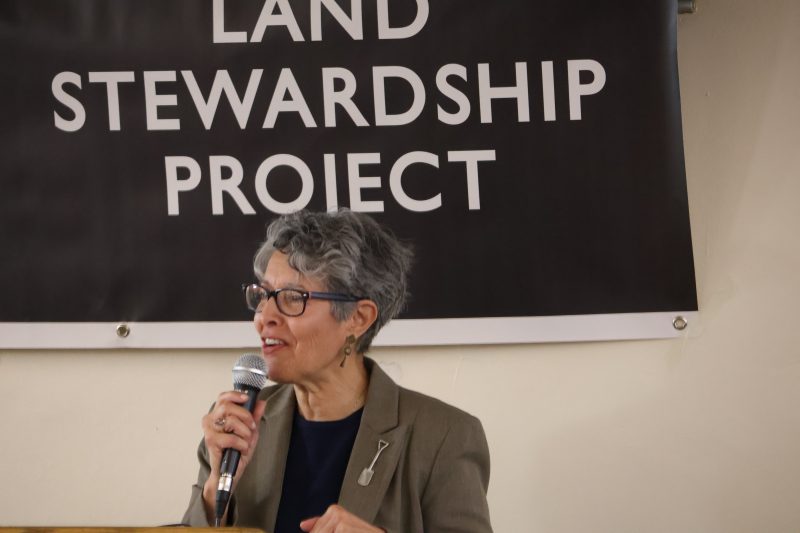
“If you don’t lift your voice, nobody’s going to do this for you,” she said. “The halls should ring with your voices.”
One story that needs to be relayed to lawmakers is the importance of getting more fresh, locally produced food to children via programs that serve schools and early childcare settings, Sara George, a farmer who also manages the Red Wing Farmers’ Market and works on local food issues for Renewing the Countryside, told breakfast attendees. The Minnesota Department of Agriculture’s Farm to School & Early Care Program has been bolstered in recent years with legislative funding that has created a statewide coordinator and helped schools and early care settings purchase and handle locally produced food. However, demand for the program’s resources far outstrips supply.
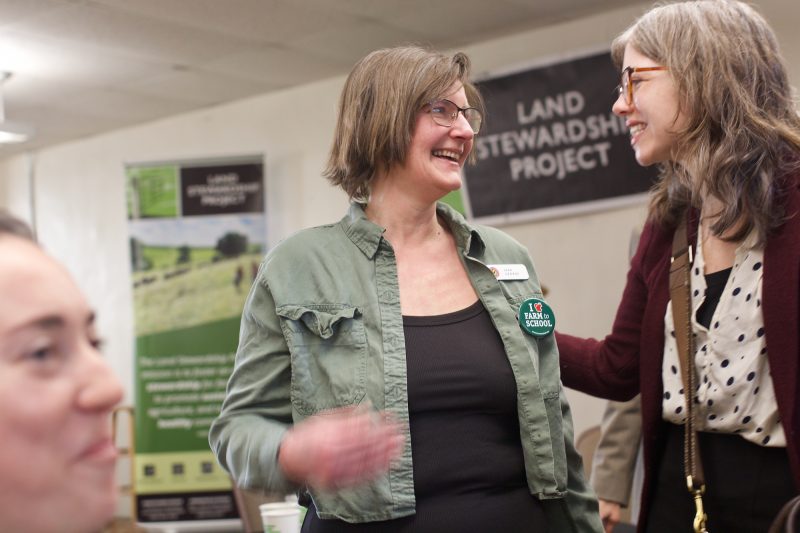
That’s why LSP joined its allies to champion legislation — House File 1795 and Senate File 1559 — that would give the Agriculture Department the opportunity to take advantage of federal funding for such initiatives, said Laura Schreiber, LSP’s government relations director. However, on March 7 the USDA cancelled funding for the Local Food for Schools and Local Food Purchase Assistance programs, which were set to bring in a combined $18 million to Minnesota for the purchase of local foods over three years. As a result, in meetings with Minnesota lawmakers after the Family Farm Breakfast, LSP members emphasized the need for the state to prioritize funding in this area so farmers who were already planning on producing food for schools and early care programs in 2025 are not left in the lurch. George said a new “Farm to Kids” campaign involving LSP, Renewing the Countryside and numerous other groups is working to advance public policy that not only feeds children healthy food, but helps them learn more about the relationship between agriculture, their community and stewardship of the land while creating greater market access for farmers.
“Getting our kids engaged in farming activities and practices, letting them learn about this, is such an important role for an initiative like this,” said George.
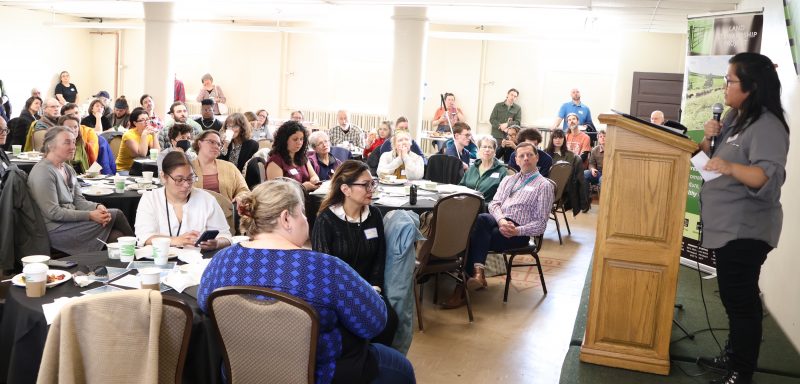
And more of that local food can be raised by people of color and other emerging farmers, said Ka Zoua Berry, a farmer and education manager at Big River Farms, which helps train new farmers. She encouraged landowners in the room to consider selling land to Black, Indigenous and people of color (BIPOC) farmers and new immigrant farmers. While roughly 20% of Minnesota’s population is made up of people of color, less than 1% of the farms in the state are operated by members of the BIPOC community. Ownership provides farmers long-term stability while building the economies of local communities, said Berry, adding that rental arrangements simply can’t provide such benefits in the long term.
“Diverse land ownership creates community vitality,” she said.
An initiative developed to assist beginning farmers with land access — the Minnesota Down Payment Assistance Program — has been overwhelmed with applications since it was established in 2022. A bill being proposed during the 2025 legislative session would improve the program by allowing farmers more than six months to purchase land with awarded funds. And as a result of skyrocketing land prices, LSP and its allies are pushing for legislation that would increase the grant award from $15,000 to $25,000 per successful applicant. Proposed legislation would also launch a study to identify policy initiatives that could break down barriers to land ownership for beginning farmers, particularly BIPOC and other emerging food and fiber producers.
And no matter who is farming the land, there’s great potential to build the kind of healthy soil that is less erosive, not as reliant on chemical fertilizers and that is resilient in the face of climate change, said Schreiber. LSP and its allies are supporting several soil health initiatives at the Legislature, including increased funding for the Soil Health Financial Assistance Grant, the creation of a groundwater protection and soil health initiative based on the successful Olmsted County program, full funding for Soil and Water Conservation District offices around the state and changes to the Livestock Investment Grant Program to better assist smaller farmers, as well as funding for the University of Minnesota’s Forever Green Initiative.
“In recent years we have seen great investment in soil health programming and greater attention paid to water quality across our state, and we need to continue to build off that momentum and prioritize funding to farmers to have access to the resources they need to adopt more soil health practices that work for their operations,” said Schreiber.
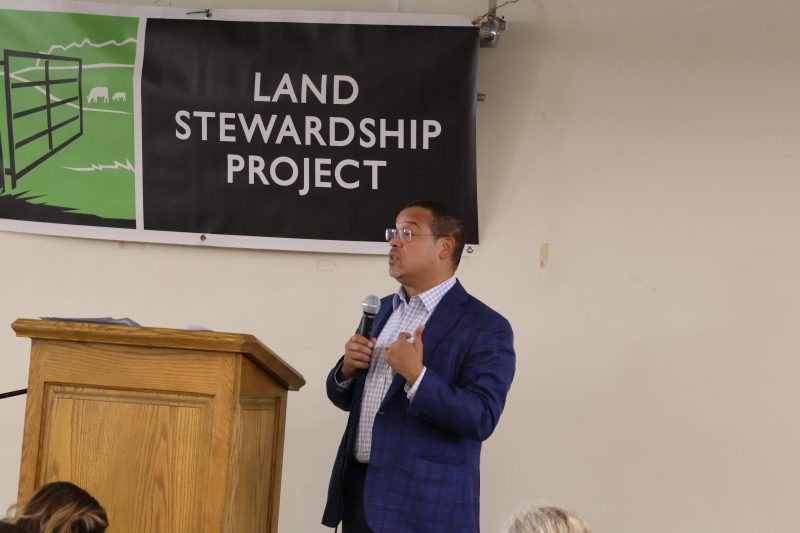
Regenerative farming operations that are producing food for local markets face massive barriers in the form of unprecedented consolidation in agriculture — from seeds and other inputs to control of how farmers can repair their own equipment and where they can sell their grain and livestock, said Attorney General Ellison. Even consolidation in health care negatively impacts farmers and rural communities as local clinics and hospitals drop services or close completely, forcing people to travel long distances to get basic care. That’s why, Ellison told breakfast attendees, it’s so important to challenge consolidation by reporting situations where it appears antitrust violations are having a negative impact on the ability of farmers and others to make a living and live an affordable life. He encouraged people who think they have evidence of antitrust violations to contact his office.
“These corporations are going to keep taking advantage of you until you fight back,” said Ellison. “All of us, every single one of us, I don’t care if you live in an apartment on the fifteenth floor, have a reason to fight for the family farm.”
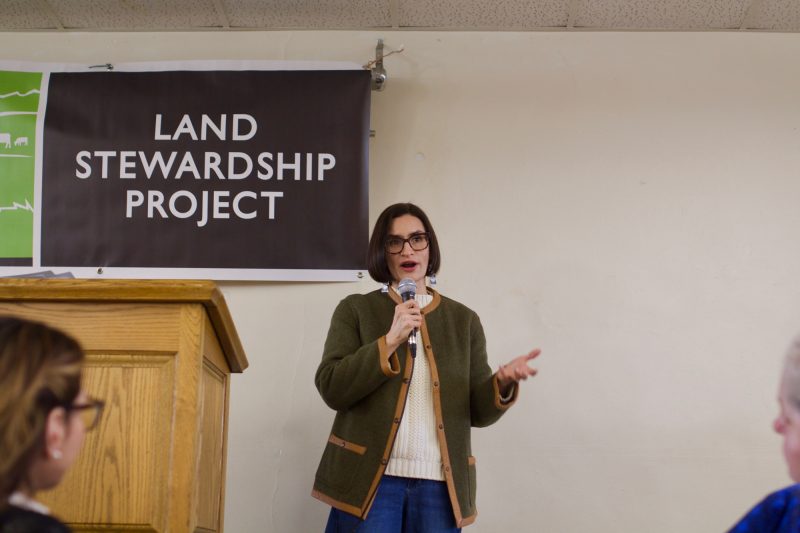
But resisting practices that threaten creating a fair, resilient farm and food system isn’t enough, said Lieutenant Governor Flanagan. She told breakfast attendees that it was exciting to be at a gathering where people were talking about all the proactive work being done to support farmers, rural communities, local foods and regenerative practices.
“Fighting matters, but building something people want to be a part of also matters,” she said. “And I see LSP and the other organizations in this building doing that every single day.”
After the breakfast, LSP members and allies walked over to the Capitol to meet with lawmakers, including the chairs of the House and Senate Agriculture Committees, to relay their stories and provide details on various legislative proposals related to connecting local farms with local schools and early childcare centers, supporting emerging farmers and building healthy soil.
“I am proud of the farmers and advocates who are making their voices heard in Saint Paul and bringing to life policies that will feed our children healthy, fresh food, while providing resources for the next generation of farmers and ensuring that our working agricultural lands in Minnesota are resilient long into the future,” said Schreiber.
-30-
The Land Stewardship Project is a nonprofit organization dedicated to an ethic of stewardship for farmland, promoting sustainable agriculture and developing healthy communities. LSP has offices in the Minnesota communities of Lewiston, Montevideo and South Minneapolis. More information is at landstewardshipproject.org.